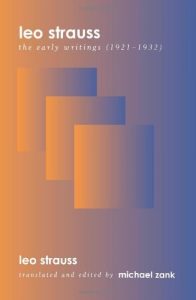Presents the early published writings of the distinguished political philosopher Leo Strauss, available here for the first time in English. “Zank places at the reader’s disposal the young Strauss’s passionate advocacy of political Zionism and his early confrontations with Spinoza, consideration of whom helped lead Strauss to formulate his teaching on ‘the quarrel between the ancients and the moderns.’” — National Review
This translation of eighteen virtually unknown early publications provides access for the first time to the origins of Leo Strauss’s thought in the intellectual life of the German Jewish ‘renaissance’ in the 1920s. Themes range from the Enlightenment critique of the religion of Spinoza and the anti-critique of Jacobi, to the political Zionism of Herzl and the cultural Zionism of Buber and Ahad Ha’am. The essays and reviews reprinted in this volume document a youth caught in the “theological-political” conflict between the irretrievability of premodern religion and the disenchantedness of “honest” atheism, an impossible alternative that precipitated Strauss to seek out the possibility of a return to the level of natural ignorance presupposed in Socratic political philosophy.
“This is a welcome collection of short writings of Leo Strauss ... Each of these essays contains intimations of the brilliance that Strauss is to show all through his writings.” — Review of Metaphysics
“Zank places at the reader’s disposal the young Strauss’s passionate advocacy of political Zionism and his early confrontations with Spinoza, consideration of whom helped lead Strauss to formulate his teaching on ‘the quarrel between the ancients and the moderns.’” — National Review
“To understand Leo Strauss, one has to see him in his original background: Germany of the 1920s. Michael Zank’s translation and introduction enable us to reconstruct his background: a young Jewish philosopher, influenced by Cohen and by Heidegger, between orthodoxy, Zionism, and atheism. The book helps us to make sense of the young Strauss—and possibly of the whole Strauss.” — Rémi Brague, University Paris
“In recent years, interest in the thought and writings of Leo Strauss has increased dramatically, both in the United States and abroad. This valuable contribution toward our understanding of Strauss brings to our attention little-known writings from his youth. The editor’s contribution is thorough, lucid, and thought-provoking.” — Stanley Rosen, Boston University
“Readers interested in Strauss’s thought and development, in the turmoil of German Jewry in the period following the first World War, in political Zionism, and in ‘religious philosophy’ generally, will find very much material here for study and contemplation. The collection and presentation are praiseworthy and should be eagerly received.” — Ralph Lerner, The University of Chicago
Michael Zank is Assistant Professor of Religion at Boston University. He is the author of The Idea of Atonement in the Philosophy of Hermann Cohen.
This translation of eighteen virtually unknown early publications provides access for the first time to the origins of Leo Strauss’s thought in the intellectual life of the German Jewish ‘renaissance’ in the 1920s. Themes range from the Enlightenment critique of the religion of Spinoza and the anti-critique of Jacobi, to the political Zionism of Herzl and the cultural Zionism of Buber and Ahad Ha’am. The essays and reviews reprinted in this volume document a youth caught in the “theological-political” conflict between the irretrievability of premodern religion and the disenchantedness of “honest” atheism, an impossible alternative that precipitated Strauss to seek out the possibility of a return to the level of natural ignorance presupposed in Socratic political philosophy.
“This is a welcome collection of short writings of Leo Strauss ... Each of these essays contains intimations of the brilliance that Strauss is to show all through his writings.” — Review of Metaphysics
“Zank places at the reader’s disposal the young Strauss’s passionate advocacy of political Zionism and his early confrontations with Spinoza, consideration of whom helped lead Strauss to formulate his teaching on ‘the quarrel between the ancients and the moderns.’” — National Review
“To understand Leo Strauss, one has to see him in his original background: Germany of the 1920s. Michael Zank’s translation and introduction enable us to reconstruct his background: a young Jewish philosopher, influenced by Cohen and by Heidegger, between orthodoxy, Zionism, and atheism. The book helps us to make sense of the young Strauss—and possibly of the whole Strauss.” — Rémi Brague, University Paris
“In recent years, interest in the thought and writings of Leo Strauss has increased dramatically, both in the United States and abroad. This valuable contribution toward our understanding of Strauss brings to our attention little-known writings from his youth. The editor’s contribution is thorough, lucid, and thought-provoking.” — Stanley Rosen, Boston University
“Readers interested in Strauss’s thought and development, in the turmoil of German Jewry in the period following the first World War, in political Zionism, and in ‘religious philosophy’ generally, will find very much material here for study and contemplation. The collection and presentation are praiseworthy and should be eagerly received.” — Ralph Lerner, The University of Chicago
Michael Zank is Assistant Professor of Religion at Boston University. He is the author of The Idea of Atonement in the Philosophy of Hermann Cohen.












